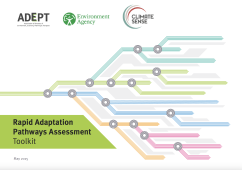New toolkit launched to help local authorities prepare for climate change impacts
A new toolkit has been launched today to help local authorities effectively plan for and manage climate change impacts, particularly flood and coastal erosion risks.
The Rapid Adaptation Pathways Assessment (RAPA) Toolkit has been developed by the Association of Directors of Environment, Economy, Planning & Transport (ADEPT), in partnership with the Environment Agency.
The RAPA Toolkit provides a structured framework for local authorities to undertake basic adaptation pathways assessments through collaborative workshops with stakeholders. This approach supports strategic, flexible decision-making in the face of climate uncertainty, widely recognised as global best practice in adaptation planning.
The RAPA methodology centres on two fundamental questions:
- Are there climate change impacts that make current assets or services inefficient, ineffective, or redundant?
- What are the best options for enabling local authorities to continue meeting their objectives?
By answering these questions at different levels of climate impact, authorities can construct sequences of actions or 'pathways' that keep them on track to meet objectives through to 2100.
The toolkit has been rigorously tested through pilot workshops in three diverse locations: Marlborough (Wiltshire Council), Adur & Worthing (West Sussex County Council) and Severnside (South Gloucestershire Council & West of England Mayoral Combined Authority).
These pilots provided valuable insights that have shaped the final toolkit, ensuring it meets the practical needs of local authorities across different geographic and risk contexts.
Ann Carruthers, President of ADEPT, said: "Local authorities are on the frontline of adaptation to climate change: minimising the negative impacts of extreme weather on people’s lives, property and critical infrastructure.
“The RAPA Toolkit is a practical tool that empowers local authorities to take timely action and make informed investments, avoiding costs associated with acting too early or too late. Taking appropriate action can safeguard economic stability, vulnerable communities, ecosystems and biodiversity while enhancing the quality of life of residents.
Harry Chalk, Environment Agency’s Adaptation Pathways Business lead, said:
“With 6.3 million properties in England in areas at risk of flooding from rivers, the sea or surface water, it is vital that local authorities can make the best decisions when it comes to adapting to our changing climate.
“Our Adaptation Pathways Programme shows earlier collaboration between local authorities and their partners supports effective decision-making, and through the new toolkit we are empowering them to deliver positive change for their communities.”
The toolkit is available here.

